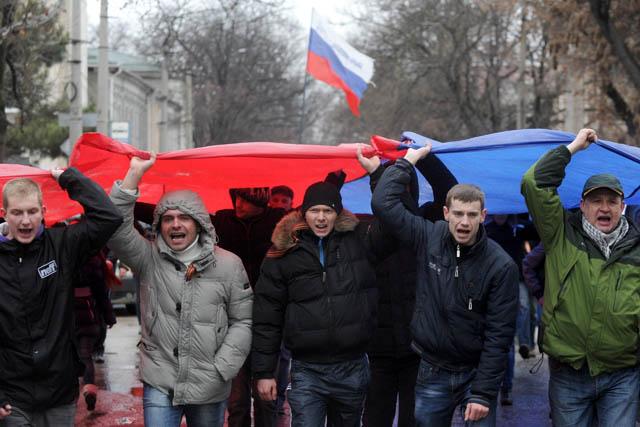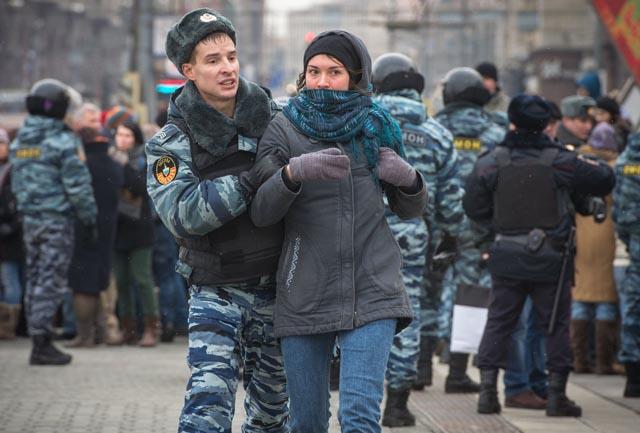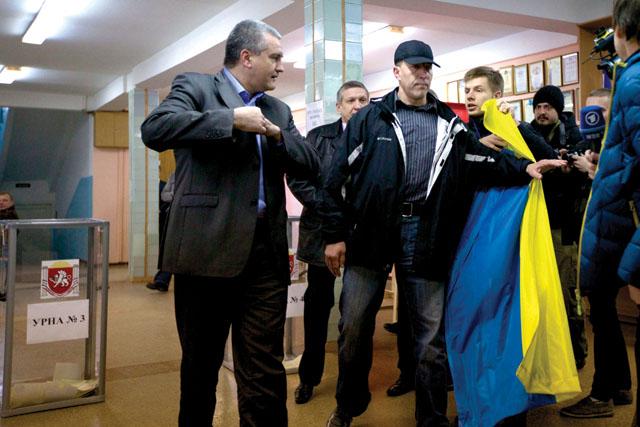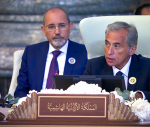You are here
Russia, West try to hammer out Ukraine diplomacy
By AP - Mar 06,2014 - Last updated at Mar 06,2014
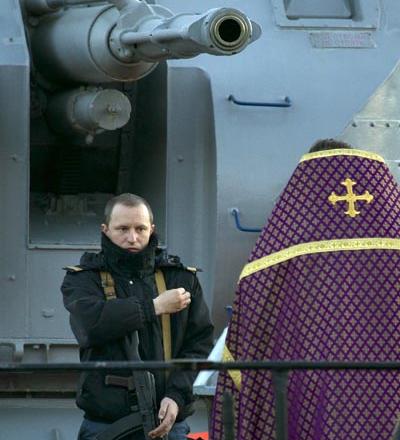
PARIS — Facing off in Europe’s capitals, Russia and the West began trying to build the elements of a diplomatic solution to Europe’s gravest crisis since the Cold War — even as the West appeared increasingly resigned to an entrenched Russian presence in Crimea.
NATO hit back by putting Russia on suspension, and the European Union extended $15 billion in aid to Ukraine, matching the amount the country’s fugitive president accepted from Moscow to turn his back on an EU trade accord.
As peace efforts progressed in Paris and Brussels, volatility reigned on the ground in Ukraine: A special UN envoy visiting Crimea came under threat by armed men who forced him to leave the region. Meanwhile, hundreds of demonstrators, many chanting “Russia! Russia!” stormed a government building in eastern Ukraine — renewing fears that turmoil could spill out of Crimea and engulf other Russian-dominated parts of Ukraine.
Ukraine’s prime minister told The Associated Press in his first interview since taking office that he still feared Russian President Vladimir Putin might attempt more land grabs: “Mr. President,” Arseniy Yatsenyuk said, “stop this mess”.
Yatsenyuk vowed to keep Crimea as part of Ukraine, but expressed openness to granting it more autonomy. Ukraine’s foreign minister, Andriy Deshchytsia, told the AP that pro-Russian citizens in Crimea must be willing to replace armed forces with international observers if they want a vote on more self-rule.
But most of the bargaining chips Wednesday belonged to Russia, whose troops are fanned out across Crimea and control most of its strategic facilities.
A growing chorus of prominent American voices expressed resignation that Crimea was lost to Russia: “I’m not optimistic they’re going to leave,” said Michael McFaul, who served as Obama’s ambassador to Russia until last week.
US Secretary of State John Kerry, Russian Foreign Minister Sergey Lavrov and several European counterparts conducted an intense round of diplomacy in Paris to try to find an exit strategy in Ukraine. While negotiations were inconclusive, top European officials expressed optimism that at least the two sides were talking — and making progress.
“For the first time, starting with this meeting in Paris, something moved in the right direction,” said French Foreign Minister Laurent Fabius.
Lavrov, speaking in Spain before meeting with Kerry, warned against Western support of what Moscow views as a Ukrainian coup, saying that could encourage government takeovers elsewhere.
“If we indulge those who are trying to rule our great, kind historic neighbour,” Lavrov said, “we must understand that a bad example is infectious.”
Russia expressed openness to international mediation, and the talks were a “work in progress”, said a French diplomat on condition of anonymity because of government policy. But a major sticking point has been Moscow’s refusal to recognise Ukraine’s new government much less sit down at the table with them.
“I wish I could give you some good news,” said Polish Foreign Minister Radoslaw Sikorski, “but unfortunately it hasn’t been possible to bring together the foreign ministers of Ukraine and Russia”.
Wednesday’s Paris gathering, originally scheduled to deal with the Syrian refugee crisis, came after Putin appeared to step back from the brink of war, telling reporters in his first comments since the Crimea takeover that he has no intention to “fight the Ukrainian people”.
NATO tried to apply pressure on Moscow in its own talks with Russia in Brussels.
The Western alliance’s secretary-general, Anders Fogh Rasmussen, said that ambassadors for the alliances 28 member states decided after a meeting with their Russian counterpart to suspend plans for a joint mission as well as all civilian and military meetings.
Rasmussen said because of Russia’s military action in Ukraine’s Crimean peninsula “the entire range of NATO-Russia cooperation [is] under review”. Rasmussen said the alliance will continue to meet with Moscow at the political level but insisted that halting all other cooperation “sends a very clear message to Russia”.
One key piece of leverage that the West has over nearly bankrupt Ukraine: Hard cash. The three months of protests that triggered Ukraine’s crisis erupted when Yanukovych accepted $15 billion in aid from Putin in exchange for dropping an economic partnership deal with the EU. On Wednesday, the EU matched the aid — which the Russians withdrew after Yanukovych’s downfall — and the US topped that up with an additional $1 billion.
Meanwhile, Ukraine’s former prime minister — the heroine of Ukraine’s 2004-2005 Orange Revolution and Yanukovych’s arch-enemy — called on the West to force Russia to withdraw troops from Crimea.
Yulia Tymoshenko, who was released from prison two weeks ago, said that any negotiations about Ukraine’s future should be conducted directly between the United States, the European Union and Russia — and insisted no compromises should be made to appease Moscow.
“We believe that the aggressor must leave without any conditions,” Tymoshenko told the AP in an interview.
British Foreign Secretary William Hague said a key demand was for Russia’s military to pull back to its Black Sea bases to show a tangible de-escalation, but he did not press on a Thursday deadline as European diplomats had initially warned. EU talks about possible sanctions against Russia were scheduled Thursday in Brussels.
The EU on Wednesday also froze the assets of 18 people held responsible for misappropriating state funds in Ukraine, echoing similar action in Switzerland and Austria. The list, which likely targeted officials in the ousted government or businessmen related to them, were withheld until Thursday to prevent anyone from withdrawing the funds at the last minute.
Russia has suggested that it will meet any sanctions imposed by Western governments with a tough response, and Putin has warned that those measures could incur serious “mutual damage”.
In Crimea, UN special envoy Robert Serry was threatened by 10 to 15 armed men as he was leaving naval headquarters in Crimea, said UN deputy secretary general Jan Eliasson. When the men ordered Serry to go to the airport, Serry refused — but then found himself trapped because his car was blocked, Eliasson said.
The Dutch envoy was later spotted by reporters in a coffee shop, as men in camouflage outfits stood outside. He got into a van with the men, and was taken to Simferopol airport.
Later, an Associated Press reporter found Serry in the business class lounge of the Simferopol airport.
“I’m safe. My visit was interrupted for reasons that I cannot understand,” the Dutch diplomat said in a statement to AP. He said nothing more.
Related Articles
Ukraine’s ousted pro-Moscow president Viktor Yanukovych emerged defiant Thursday from five days in hiding as the country’s new leaders issued a blunt warning to Russia against any aggression on the volatile Crimean peninsula.
Ukraine warned Sunday it was on the brink of disaster and called up military reservists after Russia’s threat to invade its Western-leaning neighbour risked sparking the worst crisis since the Cold War.
Crimeans voted Sunday in a referendum to join former political master Russia as tensions escalated in eastern Ukraine in the worst East-West crisis since the Cold War.


